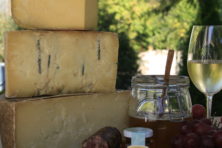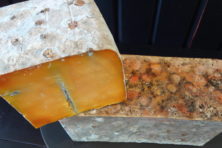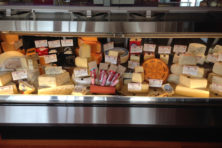The Cheese Insider
- Share
- Tweet
- Pin
- Share
When it comes to cheese there are all kinds of adjectives used to describe them. You will hear terms like ‘artisan,’ ‘specialty,’ ‘washed rind,’ ‘bloomy rind,’ ‘raw milk,’ ‘cave aged,’ ‘farmstead,’ and the list goes on and on. While there are many ways to classify cheeses, it’s important to properly categorize different varieties by how they are produced. Cheeses generally fall into one of four production categories: mass-produced, specialty, artisan, and farmstead.
• Mass-produced cheeses don’t sound very romantic because they are produced in huge cheese plants that make hundreds of thousands of pounds of cheese daily. Many times these cheese plants are fully automated. This type of plant usually buys its milk from a number of very large dairies.
The cheese producer has the ability to have every batch of cheese be consistent, meaning that every batch will taste the same. The theory behind this is that consumers want to have the same cheese every time they buy it, no matter the time of year or the location of the purchase.
Just because they are mass produced cheeses does not mean that some of them are not good cheeses, in some cases, excellent cheeses. The cheddars made by Kraft and marketed under the Cracker Barrel label, and the cheddars made by Tillamook in Oregon, are good examples of high quality cheeses that are mass-produced.
• Specialty cheeses are produced with less mechanization than mass-produced varieties, and are usually produced in smaller amounts. Specialty cheesemakers pay particular attention to flavor and texture profiles, but these cheeses are not considered to be “handmade.” This category includes many of the Italian and Mexican style cheeses being sold, as well as a number of flavored cheeses.
• Artisan cheeses are primarily handmade in small batches by an individual cheesemaker. Most artisan cheese making facilities use a minimum of mechanization, keeping things as close to old/traditional methods as possible.
• Farmstead cheeses must be made with milk from the cheesemaker’s own animals, and the cheese must be made on the farm where the animals live. Milk used in the production of farmstead cheeses may not be obtained from any outside source. A cheese can be classified as both artisan and farmstead if the cheese is made by hand and the milk comes from the farm where the cheese is made.
The cheeses we carry in our shop are fresh artisan and farmstead cheeses from Wisconsin, most of which are cut to order off of a wheel or loaf, not pre-packaged. When we began our business five years ago, we set out to get to know the cheesemakers that make the cheese we carry, and to visit as many as many of the cheese plants as possible. The artisan cheesemakers we represent range from larger companies like BelGioioso in the Green Bay area and Sartori in Plymouth to smaller plants like Roelli Cheese in Shullsburg and Hidden Springs Creamery in Westby. They all share two things in common, they make great cheese, and they are good people.




